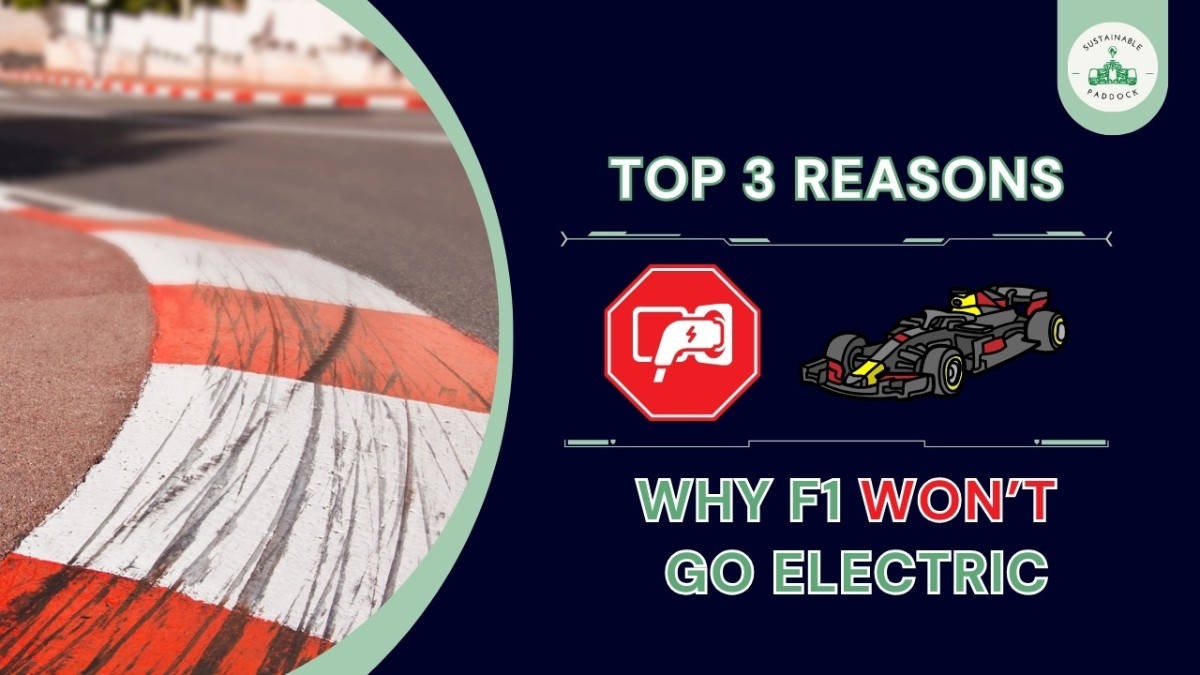Formula 1 is taking a time-off this Easter. And as Formula E gears up for Tokyo E-Prix at the same time, I have found myself contemplating the possibility of Formula 1 making the transition to electric power. Given the sport’s bid to be more sustainable, can we really witness F1 switch to EV in the future?
No time for a longer read? I got your back – watch this reel instead
Before we cut to the chase, let’s talk F1’s intentions first. Under the current regime, as proved by Stefano Domenicali, going electric is off the cards. In February 2023, a former Ferrari man said F1 “will never go electric”. Hard to imagine a stronger claim, considering Domenicali is a serving CEO of the series.
However, it doesn’t mean F1 is pulling out of its sustainability charge. In fact, the idea is to acknowledge other solutions, without which – in an attempt to decarbonize both motorsport and society at large – EV would end up being a needle in the hay.
But what if Domenicali steps down and his successor would have a different opinion? Well, that would change … exactly nothing. You see – there are certain agreements in motorsport, which grants exclusivity to some parties, simultaneously closing the doors to others.
Alright! Enough of me being mysterious. The combination of the aforementioned features make up the total of 3 reasons why Formula 1 won’t go electric. Allow me to lift the veil of secrecy for you!
Formula 1 won’t go electric: Road relevant tech is a top priority
Starting the first announcement on a switch to sustainable fuels in 2026, this narrative is ubiquitous in F1’s communication.
According to official estimates, by 2030, less than 10% of cars on the road will be electric. In other words, over 90% would be an Internal Combustion Engine (ICE) vehicles, powered by fossil fuels.
With ICE comes the sound many loves, but also pollution the environment hates. Worldwide, among all type of transportations, cars are the biggest contributors (percentage-wise) to CO2 emissions. Needless to say, keeping the status quo won’t improve the situation.

And that’s where Formula 1 comes in. F1 believes it can cure the problem and satisfy each party. The golden mean is of course sustainable fuel with its drop-in characteristics, allowing carbon-neutral refuelling of any ICE car. Yes, yours too.
If Formula 1 opted for the electric pathway, the chance to test sustainable fuels in real world conditions, along the work on their commercialization, would be irrevocably lost.
Formula 1 won’t go electric: Fear of Humiliation
Remember the beginning of a hybrid era in 2014? And I am not talking about the famous Battle in the Desert between Rosberg and Hamilton.
For those who do not remember, in its early days hybrid F1 cars weren’t exactly speed demons to the concern of the entire paddock. There is a risk a switch to electric power would result in history repeating itself, but with a vengeance.
In that context, Red Bull complaints regarding 2026 regulations, which will see 50:50 split between ICE and the electrical output, are particularly interesting.
Red Bull, relying on data from its simulator, believes a 50:50 ratio would force drivers to downshift on the straights to regenerate batteries that themselves would compromise weight and cooling.
Red Bull may have its own interest in criticising the idea of more electric power in F1. But even if so, a performance comparison of Formula 1 and Formula E speaks volumes. And, as for now, it’s anything but good news for the idea of going full electric.

Formula 1 won’t go electric: Competition leaves no choice
Speaking about Formula E, the series is the primary reason why Formula 1 won’t go electric or even consider this solution instead of sustainable fuels. Why?
First, let’s be logical about it. In the hypothetical scenario, in which Formula 1 embraces electric technology, the whole point of Formula E would no longer be relevant. After all, what distinguishes FE from the other single-seater series is the electric power. F1 would eat alive its less popular competition.
There is one big but, which even prevents that from happening. Alejandro Agag – Formula E founder – was clever enough to secure an exclusive agreement between him and the FIA, according to which FE can be the only electric single-seater series until, well, 2039.
It leaves power in Agag’s hands. To go electric, Formula 1 would have to strike a deal with the Spaniard, and I don’t see that happening. The deal would involve tons of money, which as of today (2024), Formula 1 is not willing to invest. Besides, chances of Agag accepting the offer now are as likely as Nicholas Latifi filling in Red Bull’s second seat in 2025.
Decoding why Formula 1 won’t go electric together
While closing curtains on the debate around introducing fully electric engines to Formula 1, it’s important to recognize that the opposition to this technology goes beyond a simple ‘no.’ Dispute over why Formula 1 won’t go electric can be rich in arguments that ultimately support a sustainable decision-making process.
As we wrap up the discussion, I want to hear your take! What surprised you the most? Share your thoughts in the comments below, drop me a message on Instagram, or shoot me an email at sustainable.paddock@gmail.com. Your insights fuel the conversation – let’s keep it rolling!


